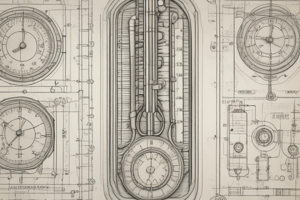Podcast
Questions and Answers
Why are measurement standards important in metrology?
Why are measurement standards important in metrology?
- To discourage the exchange of information
- To establish a common framework for accurate measurements (correct)
- To confuse people with different measurement units
- To complicate the process of comparing measurements
What would happen if there were no measurement standards for building construction?
What would happen if there were no measurement standards for building construction?
- Construction would be faster
- Building materials would become cheaper
- There would be generally higher quality buildings
- There would be chaos in determining the correct length or weight of materials (correct)
Which organizations are involved in creating measurement standards?
Which organizations are involved in creating measurement standards?
- National Organization for Measurements (NOM)
- National Institute of Measurements and Technology (NIMT)
- International Institute of Measurements (IIM)
- International Organization for Standardization (ISO) (correct)
What role do measurement standards play in maintaining consistency in different fields?
What role do measurement standards play in maintaining consistency in different fields?
How do measurement standards benefit industries?
How do measurement standards benefit industries?
What function do measurement standards serve in exchanging information?
What function do measurement standards serve in exchanging information?
What is the purpose of a reference standard in metrology?
What is the purpose of a reference standard in metrology?
Which organization meticulously maintains the standard kilogram in the United States?
Which organization meticulously maintains the standard kilogram in the United States?
What role do measurement standards play in manufacturing industries?
What role do measurement standards play in manufacturing industries?
What is a key advantage of using measurement standards in scientific research?
What is a key advantage of using measurement standards in scientific research?
What challenge is associated with the current standard kilogram?
What challenge is associated with the current standard kilogram?
How are researchers addressing challenges related to measurement standards?
How are researchers addressing challenges related to measurement standards?
Study Notes
Measurement Standards in Metrology
Metrology, the science of measurement, lays the foundation for our ability to quantify and compare the world around us. Without a universally agreed-upon set of measurement standards, consistency and accuracy within industries, scientific fields, and even everyday life would be impossible. In this article, we'll delve into the importance of measurement standards, how they're established, and their role in maintaining a uniform system for measurement.
The Need for Measurement Standards
Measurement standards serve as references for comparing and verifying measurements against. They provide a common language that allows us to exchange information about the physical world and to compare measurements made at different times and in different places.
Imagine trying to build a bridge or construct a building without a common standard for length, mass, or time. The task would be chaotic, with debates over the 'correct' length or weight of materials. Measurement standards eliminate such debates and provide a framework for accurate and reliable measurement outcomes.
Establishing Measurement Standards
Measurement standards are created through a rigorous process by international and national standards organizations. The International Organization for Standardization (ISO) and the National Institute of Standards and Technology (NIST) are two prominent examples of these organizations.
To establish a standard, these organizations designate a specific artifact, known as a reference standard, which serves as the ultimate measurement reference. For example, the standard kilogram is a bar of platinum-iridium alloy, meticulously maintained by NIST in the United States.
These organizations also develop calibration methods and protocols, which ensure that measurements made in various locations and at different times can be accurately compared. One such protocol is the International System of Units (SI), which is the modern metric system adopted worldwide.
The Role of Measurement Standards in Metrology
Measurement standards are vital to metrology as they provide a basis for comparison and verification of measurements. They also help in maintaining consistency and accuracy across different fields and industries.
For instance, manufacturing industries rely on measurement standards to ensure that components are precisely fabricated and assembled. In the field of science, measurement standards enable researchers to perform experiments in a reproducible manner and share their findings with other scientists.
In addition, measurement standards contribute to the improvement of international trade and collaboration. By adhering to a common set of measurement standards, countries can assess and compare their goods and services, promoting fair trade and economic growth.
Challenges and Future Directions
While measurement standards have revolutionized the way we measure the world, they are not immune to challenges and limitations. For example, the current standard kilogram is made of a single bar, which can be influenced by external factors such as temperature and humidity.
To address such challenges, researchers are exploring new measurement techniques and technologies. For instance, some have proposed the use of atomic clocks and quantum sensors for more precise and stable measurements.
Metrology, as a field, is constantly evolving, and its measurement standards are constantly being refined and updated to meet the demands of the modern world. By embracing new technologies and continuing to work together, we can ensure that measurement standards remain reliable and relevant for generations to come.
Studying That Suits You
Use AI to generate personalized quizzes and flashcards to suit your learning preferences.
Description
Explore the importance of measurement standards in metrology, how they are established, and their role in ensuring accuracy and consistency across different fields and industries. Learn about international and national organizations that create measurement standards and the challenges faced in maintaining and improving these standards.





